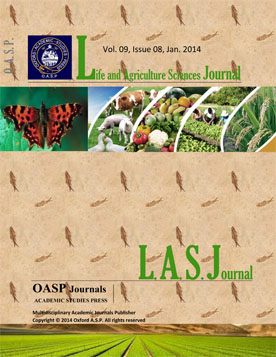Download Center
 |
The cognitive foundations of farmers attitudes towards conservation practices as a basis for policy and extension Life and Agriculture Sciences Journal (LASJ), Volume 2, Aug 2017 Abstract
In order for soil degradation to be halted and conservation schemes and extension efforts to succeed, it has become clear that we must understand farmers motivations with respect to the adoption of soil conservation measures. Many researchers acknowledge the role that farmers attitudes play in the adoption of soil conservation and, hence, the impact of attitude on the success of policy instruments and extension efforts. However, attitudes of farmers towards specific conservation behaviours have seldom been investigated. Rather, researcher relies on a general and often missspecified and hence wrongly assessed measure of farmers attitudes. This has been despite the progress that attitude-behaviour research has received in the field of sociopsychology on the one hand and the success of such research on other areas such as food consumption, health behaviour and leisure choice on the other hand. Partly driven by the results of some noteworthy review papers on the factors influencing adoption of soil conservation practices ? which revealed that most classic adoption variables in fact are mostly insignificant ? recent literature has seen a renewed interest in attitudinal variables as determinants of conservation behaviour. Most of these studies, however, still use a directly assessed measure of attitude. While this research is valuable in itself, it provides limited scope for intervention by means of policy instruments and extension effort. This paper reports on a study that was conducted in Belgium to elicit the cognitive foundations of farmers attitudes towards three soil conservation measures. The expectancy value method was used to identify the behavioural beliefs behind farmers attitudes. The results can be very useful in three domains: (i) for formulating policy instruments; (ii) for improving extension efforts and (iii) for developing conservation practices. The results show, for instance, that the use of subsidies will at this moment only induce a temporary intention to adopt conservation practices, since farmers attitudes, which are a more reliable indicator of a behaviour change are not affected by the presence of a subsidy scheme. Further, the results show that the nonadoption of soil conservation practices, which is regarded by many researchers as irrational behaviour, is in fact very rational. Indeed, farmers systematically overestimate the probability of negative consequences, while underestimating the probability of positive consequences. Author(s): E. Wauters |
| Choose an option to locate/access this article/journal | ||
|
Editorial
The process of peer review involves an exchange between a journal editor and a team of reviewers, also known as referees. A simple schematic of OASP's Peer-Review process has been shown in this section.
